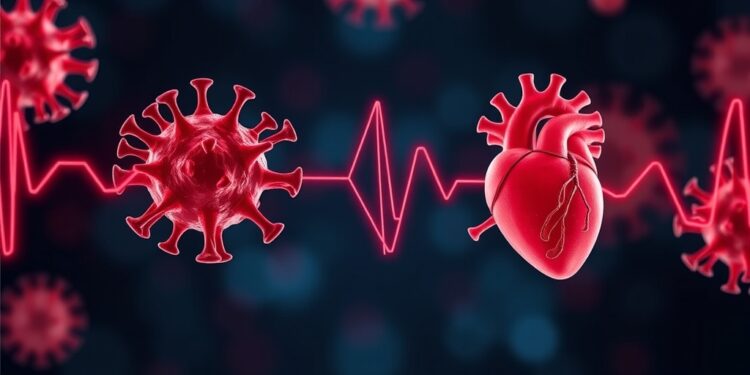Human papillomavirus (HPV) has long been recognized for its role in various cancers, particularly cervical cancer. However, new research presented at the American College of Cardiology’s Annual Scientific Session suggests that HPV may also play a significant role in increasing the risk of heart disease, specifically coronary artery disease. This new dimension in understanding HPV’s influence on health highlights an important connection that has previously been overlooked in cardiovascular studies.
Recent studies have indicated a troubling association between HPV infection and cardiovascular conditions. The comprehensive meta-analysis involving nearly 250,000 patients marks the first effort to consolidate data from global studies to examine the relation between HPV and heart-related diseases. The conclusive findings present a compelling case that warrants urgent attention from the medical community. Clinicians, researchers, and patients should reconsider HPV not just as a sexually transmitted infection that leads to certain types of cancer, but also as a potential risk factor for cardiovascular ailments.
During the study’s presentation, Stephen Akinfenwa, MD, the lead author and a resident in internal medicine at UConn School of Medicine, underscored the implications of the findings. The research emphasizes the need for deeper exploration into how HPV could influence cardiovascular health. Although the exact biological mechanisms remain unidentified, an increase in chronic inflammation is hypothesized as a potential catalyst for this relationship. Inflammatory processes are known contributors to a myriad of cardiovascular issues, making this link particularly concerning.
Furthermore, the urgency of vigilant monitoring for cardiovascular health among HPV-positive individuals cannot be overstated. Traditional cardiovascular risk factors such as hypertension, diabetes, and smoking have been extensively studied, but Akinfenwa points out that approximately 20% of cardiovascular disease occurrences remain unexplained by these factors. This underscores the need to target and understand non-conventional risk factors, such as HPV, which may contribute to this unidentified portion.
The newly published research shows that HPV-positive patients face a notably higher likelihood of cardiovascular disease overall—a staggering 40% greater risk. The elevated risk is further amplified when examining coronary artery disease specifically, where HPV-positive individuals exhibit double the likelihood of developing this condition compared to those without the virus. After controlling for confounding factors like lifestyle choices and medical history, the study still established that HPV-positive patients face a 33% heightened risk for cardiovascular disease, highlighting the resilience of this relationship across various analyses.
The current CDC guidelines advocate for the HPV vaccine in children and teens as a preventive measure against several cancers linked to the virus. Nonetheless, the majority of U.S. adults did not receive the vaccine, largely due to being past the recommended age when the vaccine became available in 2006. Given the connection between HPV and heart disease, this preventive measure may need reevaluation. Akinfenwa suggests that encouraging vaccination could serve a dual purpose—not only protecting against cancer but potentially mitigating risks for cardiovascular complications as well.
The study’s meta-analysis draws from seven global studies conducted over a span from 2011 to 2024, providing a robust evaluation of the impact of HPV on cardiovascular outcomes with a follow-up duration ranging from three to seventeen years. Each of these studies contributed to a comprehensive understanding of how HPV status correlates with cardiovascular health, enriching the analysis with diverse demographic and geographic representation.
Looking forward, the implications of this research extend beyond mere associations. Akinfenwa emphasized that this line of inquiry into HPV’s impact on heart disease is merely at its inception. He calls for further studies to dissect the strength of this relationship and to elucidate the underlying mechanisms at play. Understanding whether the act of reducing HPV infections, potentially through increased vaccination efforts, could correlate with a decrease in cardiovascular incidents is a pivotal question that remains to be examined.
In addition to heart disease, the significance of HPV as a public health concern should not be understated. By expanding the dialogue surrounding HPV to include its impact on cardiovascular health, the medical community can further prioritize both vaccination and awareness initiatives. This integration of knowledge can foster a comprehensive approach to patient care that includes monitoring heart health in those diagnosed with HPV.
At the upcoming ACC.25 session, detailed discussions surrounding these findings will further enrich the conversation about HPV’s broader health implications. Researchers and healthcare practitioners from around the world will convene to share insights derived from the latest studies, exploring preventive strategies and innovative treatments that could revolutionize how cardiovascular disease is approached considering HPV’s influence.
As this relationship between HPV and cardiovascular health unfolds, it opens a gateway for interdisciplinary research, linking infectious disease and cardiology in ways that have yet to be fully understood. The potential for identified connections influencing health policies, prevention strategies, and clinical practices is immense, suggesting that further exploration in this arena could hold the key to regulating not only cancer proliferation but also the risk of heart diseases in populations at large.
In conclusion, the growing body of evidence linking HPV to cardiovascular diseases demands a reexamination of how health professionals and the public perceive HPV’s significance. Recognizing the virus as a potential cardiovascular risk factor, alongside its established role in cancer development, may drive forward essential research and public health campaigns focused on vaccination and preventive measures that could pave the way for healthier futures.
Subject of Research: Human Papillomavirus (HPV) and its Relation to Cardiovascular Disease
Article Title: HPV Linked to Increased Risk of Heart Disease, New Study Reveals
News Publication Date: [Date not provided]
Web References: [Not applicable]
References: [Not applicable]
Image Credits: [Not applicable]
Keywords: HPV, cardiovascular disease, coronary artery disease, vaccination, chronic inflammation, heart health.




